
- Home
- Pakistan
- Speakers emphasize shared future of Pakistan, Afghanistan rooted in peace, culture, economic connect ..
Speakers Emphasize Shared Future Of Pakistan, Afghanistan Rooted In Peace, Culture, Economic Connectivity
Muhammad Irfan Published September 30, 2025 | 05:00 PM

ISLAMABAD, (UrduPoint / Pakistan Point News - 30th Sep, 2025) Speakers at the Pak-Afghan Dialogue 2025 emphasized that the future of Pakistan and Afghanistan should be shaped not by weapons but by ideas, mutual trust and people-centric policies.
The high-level dialogue brought together political leaders, diplomats, academics and civil society members from both countries, who unanimously called for deeper cooperation in education, culture, economy, and counter-extremism efforts.
Coordinator to the Prime Minister on Commerce Rana Ihsaan Afzal highlighted the shared history, civilization, and cultural ties between the two nations, referring to common landmarks such as the Silk Road and the Khyber Pass. “Our people have exchanged values, poetry, and ideas for centuries. It is now time to invest in education, language, culture, literature, music, and healthcare collaboration,” he said. He proposed the establishment of cultural exchange offices to institutionalize these ties.
Chairperson and President of the South Asian Strategic Stability Institute (SASSI) University, Dr. Maria Sultan, stressed the importance of regional economic integration through projects like the China-Pakistan Economic Corridor (CPEC) and the Turkmenistan-Afghanistan-Pakistan-India (TAPI) pipeline.
In her presentation, she said Pakistan's main concern was the weapons left behind in Afghanistan after the US withdrawal from the country.
She noted that over $7 billion worth of weapons remain unaccounted for, posing a serious threat to Pakistan’s border security.
“Pakistan's biggest issue is that Afghan soil must not be used for terrorism in Pakistan,” she warned, urging international coordination to track and destroy the missing military equipment.
Afghan Member of Parliament Fawzia Koofi acknowledged Pakistan’s efforts in supporting a stable and prosperous Afghanistan. “Our destinies are linked. We must promote a narrative of common goals and mutual trust,” she stated. She also raised concerns about the lack of internet access across Afghanistan, which she described as a basic necessity in today’s world.
Former Pakistani Ambassador to Afghanistan, Abrar Hussain, emphasized the brotherly ties between the two nations, noting that shared values far outweigh the differences. “Since the 1990s, Pakistan has supported peace initiatives and hosted millions of Afghan refugees regardless of ethnicity or sect,” he said.
“It’s time to build bridges and ensure our soils are not used against each other.”
Professor Dr Rasool Bakhsh Rais called for a forward-looking approach. “We must learn from past mistakes and move on. Once Afghanistan forms an inclusive government, its relations with Pakistan will evolve into something more stable and productive,” he said.
Dr Alizai, former Governor of Kabul, urged cooperation to counter extremism, calling it a shared threat. “We don’t have the luxury to remain divided. Sustainable peace demands unity and understanding,” he said.
Ambassador Nasir Ahmed Andisha of Afghanistan to the UN in Geneva emphasized enhancing people-to-people contact and regional interconnectivity.
Other speakers also echoed the need for strategic, not just tactical, engagement. Afghan politician Khan Agha Razayee criticized the Taliban regime’s inability to guarantee stability, warning that safe havens for extremist groups like TTP inside Afghanistan are a pressing concern for Pakistan.
Retired Air Marshal Amir Masood and Vice Admiral Ahmed Saeed both called for regional solutions that empower local populations and promote economic corridors to foster long-term peace.
Shafiqullah Rahamanzai proposed a model of regional cooperation similar to the European Union. “The path to a stable and prosperous future lies in coordinated efforts, shared economic interests, and mutual learning from past mistakes,” he said.
Journalist Hassan Khan pointed out the lack of direct media engagement between the two countries. “We often see each other through Western media perspectives. There’s a need to create direct media platforms to share authentic stories,” he remarked.
Ambassador Abdul Basit stressed the need for economy-based, people-centric engagement. There is an organic understanding between the people of Pakistan and Afghanistan. The time is now to transform that sentiment into policies, he added.
The participants agreed that such forums must continue to nurture bilateral trust, bridge communication gaps, and redefine the Pakistan-Afghanistan relationship based on shared culture, common goals, and mutual respect.
Recent Stories
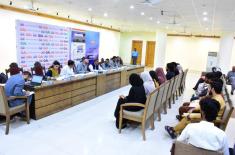
UoG scholarships ,support 3800 students
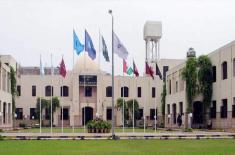
UHS launches structured house job for DPT graduates

'Mohammed bin Rashid Government Fellowships' initiative launched in collaboratio ..
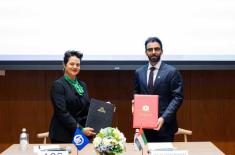
World Governments Summit, Association of Caribbean States sign Partnership Agree ..
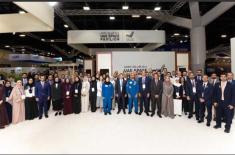
UAE takes part in International Astronautical Congress 2025

Abu Dhabi economic delegation visits US to boost investment
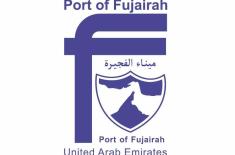
Fujairah to host 13th Energy Markets Forum tomorrow
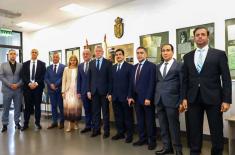
Abu Dhabi Judicial delegation reviews Serbia’s correctional, rehabilitation ce ..
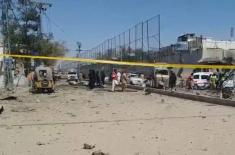
Suicide blast in Quetta kills 5, attack foiled by security forces

At least six militants killed in Quetta suicide blast, gun attack
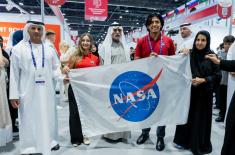
Nahyan bin Mubarak inaugurates MILSET Expo-Sciences International 2025 in Abu Dh ..
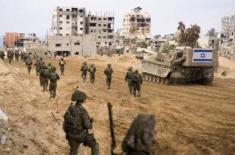
Israel allegedly targets Palestinians in Gaza after refusal to against Hamas
More Stories From Pakistan
-
Ayaz congratulates people, leadership of China on 76th National Day
2 minutes ago -
Artwork on “Our Generation: A Polio-Free Nation” displayed at RWU
2 minutes ago -
Literary icons Hussain Sehar, Iqbal Arshad remembered
2 minutes ago -
Punjab law minister approves housing, financial benefits for 17 martyred cops' families
3 minutes ago -
Monthly health steering committee meets
12 minutes ago -
Speakers emphasize shared future of Pakistan, Afghanistan rooted in peace, culture, economic connect ..
12 minutes ago
-
Senate session starts
12 minutes ago -
Senate session commences under Sherry Rehman’s chairmanship
12 minutes ago -
Petrol pumps sealed in Dera for shortage of meters
12 minutes ago -
Beautification project reviewed in Gujrat
13 minutes ago -
Inauguration of renovation project of Ali Mardan Hall Hostel at UET
22 minutes ago -
CM suspends DHOs, issues notices to DCs, removes ACs over polio cases
22 minutes ago